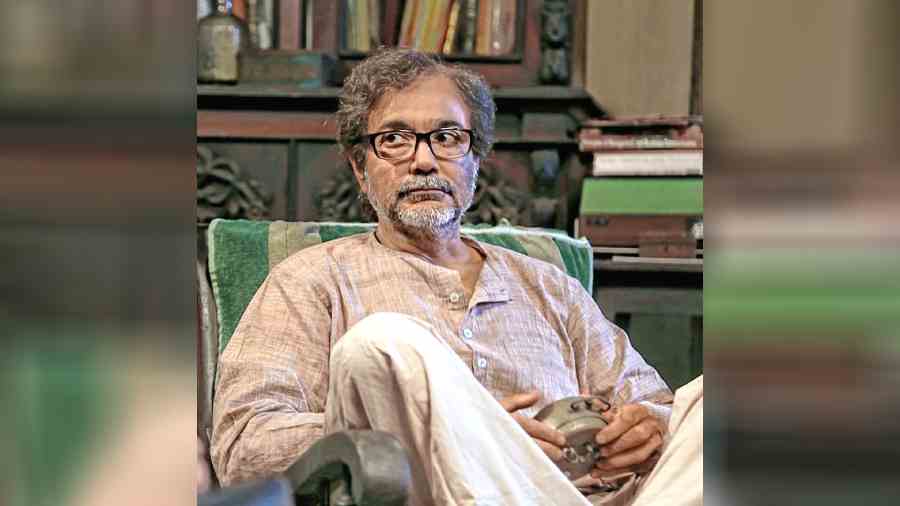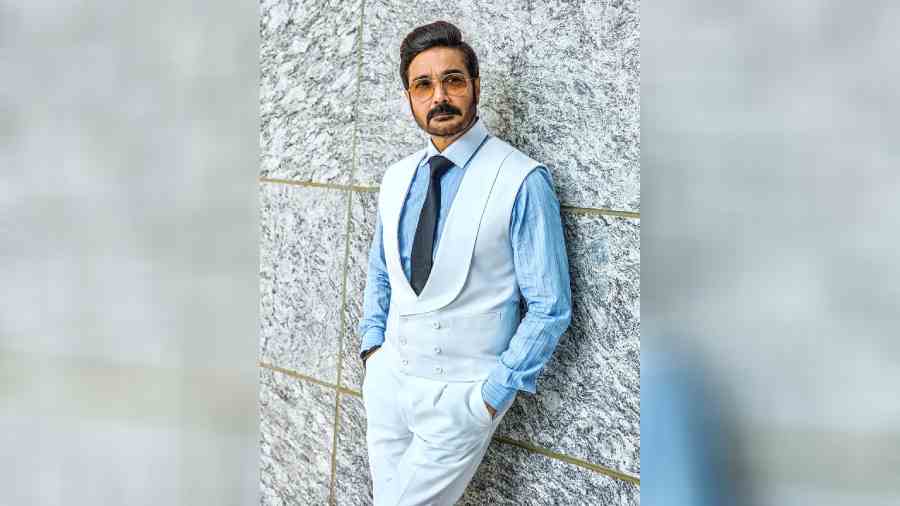In the April 14 film Shesh Pata (directed by Atanu Ghosh), Prosenjit plays a formerly well-known writer, Balmiki, who now lives in obscurity, stripped of dignity and respect. He is moody, evasive and impulsive. A year ago, a publishing house gave him an advance to write about his wife who was murdered 30 years ago. Despite repeated requests, Balmiki has not provided a single page of the manuscript. To recover the writing, the publishing house engages Sounak, a young debt recovery agent. Balmiki tells Sounak that he cannot write on his own due to ill health. Now, Sounak engages Medha to write down what Balmiki dictates. A chat with Prosenjit...
What was your first reaction when you heard the script of Shesh Pata?
I loved the script. But initially, I felt that it was really challenging because it was so difficult to predict a character like Balmiki. He is so unpredictable. The language that he speaks is also very different.
How did you start preparing for the character?
When I started working on Balmiki, then there was no looking back. I was totally into him. Make-up was important but it was not overpowering the character. I had to work a lot on other things... from my body language to the way he speaks, which changes constantly. Initially, you might think of him as a good man and then after some time you’ll feel he is not... then you’ll feel he is an intellectual and again, sometime later you’ll feel he is shrewd and sly. He has so many shades. Amidst all this, he is constantly brooding over the death of his wife. That’s traumatic for him but he never expresses it to anyone.

Prosenjit in Atanu Ghosh’s Shesh Pata, which releases in theatres on April 14
What was your reference to play Balmiki?
Atanu had given me many books to read from that period... I would go through them to work on the language... for delivery and pronunciation. The loneliness of Balmiki guided me as an actor. It moved me... that Balmiki, the artiste, is misunderstood also struck a chord with me. Artists get judged so easily these days and there’s very little they can say in defence. We are being judged every day... we are compromising somehow... those who are not compromising can become like Balmiki. Every artiste has a child inside; every artiste also has that sense of madness. I am lucky that I got to play a character like Balmiki and explore his inner world; that I could plumb the depths of such a person.
Could you connect with Balmiki on any level?
The incidents and events are different... we are completely different from each other. I could connect with the inner struggle of the artiste... when you are fighting with your own inner self. The way we have to deal with a situation when we are judged... no one has any idea what goes through our minds during such times. What we feel. The artiste or performer is just like any other human being. They feel hurt too. They go through emotional churn like everyone else. The only difference is that they cannot express themselves so openly. If they express themselves they will be judged. Balmiki’s position is clear — you cannot buy him off; you cannot buy his soul.
It’s a unique journey for Balmiki and Medha as they pursue opposing and conflicting objectives...
Yes, and he wants to go back to the memories of his wife through the interactions with Gargee’s character. Balmiki actually is a romantic. He puts up a wall, shuts himself off from everyone and never lets anyone enter that space. He only allows Gargee’s character to enter his world.
Because he trusts her?
Yes... gradually he opens himself up to her. The shoot was really challenging. I would stay in character throughout the day. I would get ready and quietly take my position on the set.
This was how you would conduct yourself on the sets of Jaatishwar.
Yes. I would sit quietly while the cinematography team would set up the lights. The film has been shot beautifully... there is this lyrical quality to the images.
There is a scene where Balmiki is completely inebriated and Gargee’s character changes him and helps him into fresh clothes. It is a fascinating sequence...
And it didn’t take very long to shoot it. Atanu set it up really well and explained it. There is that sense of closeness and intimacy in that sequence. Balmiki went through such an intimate moment after many years... however, he was completely inebriated during that time. So there was that sense of intimacy and distance throughout that sequence. Gargee was very good in that sequence and excellent in the film. It was done in one take... it was unpredictable for both of us. And this sequence was not scripted. I had felt a similar vibe during the shoot of Moner Manush. Some of the moments just happened on the spot. You cannot predict these things. And Atanu is such a sensitive director. I pray that he can always follow his vision... that he never compromises.
There is a scene in the hospital where you get really angry. How do you prepare for such a scene? Do you go back to a memory that triggers this emotion?
Of course, it is about behaving like the character... what he is feeling. But then yes, I do go back to a memory that had caused me a lot of pain. That serves as the trigger and the anger comes from that.
Balmiki’s voice has this unique texture. It has gone through the ravages of time. How did you arrive at the tonal quality? How did you dub for the character?
I’d done almost 60 per cent of the dubbing for the film. It was going on well but somehow I was not convinced. I would talk to Atanu at night after completing my dubbing, and I felt that it was missing something. We started discussing and I told him that it felt like I was dubbing.
It feels like he has gone through a lot in life and your voice reflects it... and it has that spark, that defiance too...
Finally, after trying out various things, I arrived at a tonal quality. Then I dubbed the whole film once again from scratch with that tonal quality.
With each decade you have been constantly changing yourself, innovating and staying relevant.
It is about changing with the times, be it in terms of story selection, execution or adapting to new technology. A senior person has to embrace and endorse the new and be innovative. I have immense faith in today’s youth. They are connecting with films which are authentic. When they watch Shesh Pata, they’ll realise how honest it is. I started my career with black-and-white films. Then I shifted to colour... then I experimented with new technology... I started working with new directors... it ushered in the era of multiplex films. I am very lucky. Now I have made my web debut (in Jubilee) with a major role. I am very happy.











